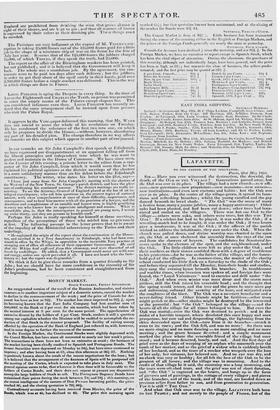In our remalks on Sir John Campbell's first speech at
Edinburgh, we have expressed our disappointment at an apparent falling off from the liberal principles and independent tone which he was wont to profess and maintain in the House of Commons. We have since seen, in the Courier of this evening, a private letter to the editor from a sup- porter of Sir John Campbell, from which it would seem that he has explained his political opinions at the district meetings of the electors in a more satisfactory manner than on his debut before the Edinburgh
constituency. The writer, who dates his letter on the 21st, says- " I have just come from Sir John Campbell's meeting with the electors of the West en I of the New Town, St. George's parish district, and have the plea- sure of confirming his continued success. The district meetings are really in- teresting. To see the Attorney-General of England placed at the bar of an in- telligent constituency, who ask him questions on the gravest topics of national interest, with clear comprehension at once of their difficulty, importance, and consequences, and to hear him answer with all the precision of a lawyer, and the directness and complaisance of an amiable and honest man, is highly gratifying to every one who knows how to appreciate intelligence and reason. What is remarkable also, is, that the interrogators in general are young men, I would say under thirty, and they are persons in humble rank."
Perhaps Sir John is really speaking for himself at these meetings, regardless of the promptings of those who misled him so grievously at first. The following passage in the letter proves that he is aware of the impolicy of the Ministerial subserviency to the Tories and their underlings.
" He explained the origin of the report about the continuation of the House- tax, and ascribed it to a Tory functionary in Edinburgh, who had been con- tinued in office by the Whigs, in opposition to the invariable Tory practice of sweeping out of office all adherents of their opponents' Government. He said that the Whigs had sajlired from this clemency, and n•ere thwarted at all hands by underlings, lie added, that a Government could never act with ease and energy, unless one spirit pervaded it all. I have not heard who the func- tionary is; but the report was disgraceful."
We think it fair to give these remarks from a quarter friendly to Sir John; but we should have far more confidence in the sincerity of Sir John's professions, had he been consistent and straightforward from the beginning.




















 Previous page
Previous page